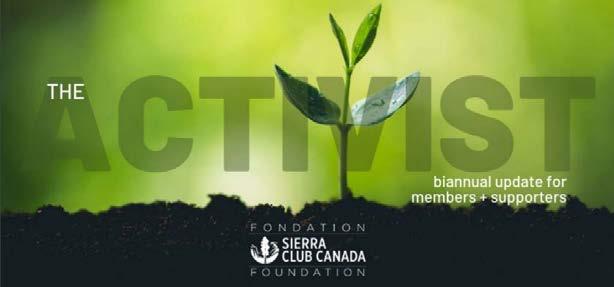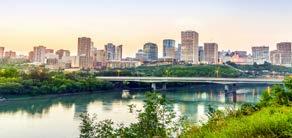JOIN SIERRA CLUB CANADA FOR A DECADE OF CHANGE

 By Caroline John
By Caroline John
It was in 2013, eight years ago when the carbon monitoring station in Mauna Loa measured levels of carbon dioxide in the atmosphere at levels above 400 parts per million for the first time in human history. Since then, investigations by the Intergovernmental Panel on Climate Change ascertain that we cannot let the atmosphere reach 430 parts per million of carbon dioxide to avoid global warming beyond 1.5 degrees, at which point there will be far reaching consequences for life on earth. Estimates show that we now have 10 years to transform our energy and consumption habits to avoid ecological disaster.
While we recover from the revelations and paralysis of the Covid-19 pandemic, we must also use this opportunity to pivot our communities and systems of governance to ensure a safe and habitable planet for all.
The Sierra Club Canada Foundation wants you to join us in a Decade of Change, 2020-2030.
Members, Chapters, friends and volunteers of the Sierra Club Canada Foundation have articulated concrete goals and actions to accomplish in this pivotal decade allotted to
us to achieve a sustainable future. We need to:
• Decarbonize the energy and transportation sector and achieve 100% clean energy by 2050.
• Demand climate action and address the extinction crisis.
• Protect 30% of our natural ecosystems by 2030 and implement systems change that sees it raised to 50% by 2050.
• Shift Canadian society to transform economic, racial and environmental inequities in tandem with other movements addressing justice and equity.
• Ensure all people have opportunities to explore and enjoy nature, inspiring and empowering a new generation of leaders to protect the environment.
Human activity and the past decades of industrial activity have warmed the atmosphere, land, and waters of our planet earth. Furthermore, it is clear that this effect is not distributed equally throughout the globe.
FALL 2021 IN THIS ISSUE: • GROUNDBREAKING WORK IN ATLANTIC CANADA • SIERRA YOUTH PODCAST SEASON 1 • A NEW NATIONAL PARK IN EDMONTON?
(continued from Decade of Change)
Regions in the poles and closer to the equator are affected faster and more severely, worsening existing inequities between developed and developing nations. CO2 emissions and other greenhouse gases such as methane and nitrous oxide have resulted in a situation where land is predicted to warm 1.4 to 1.7 times faster than the oceans; the arctic much faster than the temperate zones.
On our current trajectory, we can anticipate an intensification of the global water-cycle through higher variability in precipitation, and an intensification of wet and dry events. Hot extremes such as heatwaves and droughts will continue to intensify while cold extremes become less frequent. The current state of deforestation and the extinction of species, in addition to being a violation of natural law, contribute to a poverty in the human spirit.
While our beloved planet has seen much farther extremes in climate and ecosystems, this bout of drastic changes has been brought on by humans. We have to know where responsibility lies for the instability and uninhabitability that future generations will inherit if we stay on the current course. We have what it takes to pivot into stability and a healthy relationship with the earth we inhabit.
We have the technology, scientific knowledge, and a road map. It is up to us to organize, mobilize and pivot into healthy systems for all.
Let us act now to make all the coming years of this decade count towards a healthy future. You can donate here.
Our New MPs Should be Talking About Air Quality ONTARIO
By Jake Cole
Information being collected through the BreatheEasy project shows that Ottawa has its share of pollution — which can have serious health effects.
During the federal election campaign, some Ottawa-area candidates showed interest in the state of our city’s air quality. The Sierra Club Canada Foundation invited candidates from all the major federal parties to check out the air quality in their ridings and a few took the time to visit with us. We believe that air quality is something most people in the city should know about and understand, and so should our new local MPs.
The SCCF is carrying out the project, BreatheEasy, to measure local air quality and report our findings publicly. How is the air in Ottawa? Certainly in late July and early August, with the wildfires burning in northern Ontario, it was not fresh anywhere, with pollution levels in Ottawa several times worse than levels that are considered safe by national and international standards. Government-issued warnings at that time advised people to stay indoors and reduce strenuous exercise.
As well as being a local issue, air quality is a country-wide concern. Health Canada states in a 2021 report that ann-
ually, some 15,300 people die prematurely in our country from air pollution. That same report indicates that about 500 of that number are here in Ottawa.
Here is some late-breaking news. Just a few days ago, the World Health Organization (WHO) announced that it is changing its guidelines for recommended air pollution levels, making them almost 50-percent more stringent than before. Based on these new WHO recommendations, and using the results of the monitoring we have done so far in our project, we can say that we have found many areas in the city where the air pollution levels exceed these new guidelines. Canada’s own current guidelines for acceptable air pollution levels are not as strict as those recommended

(continued from Ontario) in the new WHO announcement.
Where are the air pollution “hot spots” in Ottawa? They can be typically situated where there is heavy traffic, lots of construction, school bus drop-off areas, where wood is being burned and where there are other sources of emissions. Even a gas-fired lawn mower in operation can create unsafe localized air quality.
While most individual neighbourhoods that we measured had lower levels of air pollution than the new WHO guidelines, some exceeded those levels. The air quality in Ottawa is generally better than most major cities but is not perfect. It could be and should be better.
Our project aims at raising public awareness about air quality in the city. We have used a team of volunteer “citizen scientists” to help with the project. We have tried to take air quality readings all over the city — in public areas, near high traffic zones, construction sites and near individuals’ homes. We held webinars with some international air
quality experts and learned what other countries and cities are doing to address air quality. We are seeking additional funding to expand the project.
Air quality is a concern for everyone. Some credible reports state that less than 10 per cent of people in the world are breathing fresh, healthy air and that climate change and global warming are making things even worse. Wildfires from near and far are creating air pollution that is now visible and harmful for many of us.
We want to once again extend an invitation to all the Ottawa-based MPs from all federal parties to meet with us and discuss an issue that affects our city, our country, our health and our future. And we invite all people in Ottawa to join our efforts by asking their new MPs what they are doing to make it easier for everyone to breathe clean air.

BreatheEasy is funded by the Ottawa Community Foundation and implemented cooperatively with Ecology Ottawa. More information is available here. You can also contact the project at breatheeasy@sierraclub.ca


Taking Action in Atlantic Canada
ATLANTIC
From the Beyond Coal Impact Report
Sierra Club Atlantic Canada’s Beyond Coal campaign has established itself as a leading voice on energy issues and climate activism in Nova Scotia this year. With the commitments of successive NS Premiers to transition to 80 percent renewable energy and get off coal by 2030, we have a pathway to achieve our Beyond Coal campaign targets.
In New Brunswick Sierra Club Atlantic Canada created infographics and fact sheet on (Small Modular Reactors) SMRs, in partnership with Susan O’Donnell and CREDNB (Coalition for Responsible Energy Development in NB). We also joined a new caucus of New Brunswick Environmental Network focused on stopping public funding for SMR development (the federal government has already committed $55 million and the NB government $30 million). Additionally we hosted Decolonizing Book Club, guided by Mi’kmaw educator Chris George from the Eel River Bar First Nation, a doctoral student at the University of New Brunswick, his research focuses on Indigenous cultural and political resurgence. The online book club included participants from around the Maritimes.
In Newfoundland and Labrador Sierra Club Atlantic Canada’s focus has been to work in solidarity with Roberta Benefiel (Grand Riverkeeper Labrador) and the North American Megadam Resistance Alliance (NAMRA) to stop the Gull Island mega dam project. If built, the Gull Island Project would block the Grand River with a massive 300foot dam; flood 23,000 hectares of pristine boreal forest; and increase already dangerous levels of methylmercury in fish and wildlife, the traditional food source of Inuit and Innu people.
FEATURE PROGRAM
2 3 CHAPTER ACTIVITY
(continued from Atlantic)
Gretchen Fitzgerald, Sierra Club’s National Programs Director, and Roberta Benefiel led a sign-on campaign for a letter opposing the Gull Island project, which they sent to the Prime Minister and the premiers of Atlantic Canada on October 13.
Going forward, the Atlantic Chapter is aiming to focus even more on speaking directly to the public on key issues, “arming the reasonable” with the information and tools they need to better understand and fight climate change.

We are also working to foster new relationships with Indigenous and non-Indigenous allies and strengthen existing ones so that together they can build a movement in Atlantic Canada that can’t be ignored.
Prospect for New National Park in Edmonton Region Sparks Excitement Prairie
By Lindsay Boucher
This summer Johnathan Wilkinson, Former Minister of the Environment and Climate Change, announced a new program to create national urban parks across Canada. Seven cities were being considered, including the greater Edmonton area. This announcement aligns with Sierra Club Canada Foundation’s goal of providing access to nature for all, protecting wildlife and habitat, and mitigating climate change with nature-based solutions.
Sierra Club Canada Foundation (SCCF), in collaboration with the North Saskatchewan River Conservation Society and CPAWS-Northern Alberta, have high hopes bringing groups together in support of the creation of a national park in the Edmonton region.



“There has never been a better opportunity to advance creating a National Urban Park in the Metropolitan Edmonton Region,” said Dr. PearlAnn Reichwein, Edmonton National Urban Park Leader with Sierra Club Canada Foundation, noting that a national urban park program is a collaborative nature-based solution to many current and future needs as we aim toward the next century. “It’s about an investment in resiliency and connecting Canadians to nature in ways that have multiple benefits for a brighter future.”
Season One of Our Youth Chapter’s Podcast is Out, Listen Now!
Sierra Youth
may arise from acute environmental disasters or from experiencing the loss of land, species, or even bodies of water. It doesn’t have to feel hopeless though, and this podcast explores how we can use our personal experiences with grief to come together and build up our communities.
In episode 8, Where Have the Good Youth Gone?, the hosts talk with Ava Hedeker, the Founder and Editor-in-chief of F(earth)er Magazine. Together they discuss interdisciplinary environmentalism and how we can understand it from a youth’s perspective - leveraging the power of journaling, storytelling, and writing.
The Metropolitan Edmonton Region is at the convergence of the boreal and parkland bioregions. It sustains high biodiversity, including 27 species of fish, such as the threatened lake sturgeon, and corridors for wildlife such as deer and moose -- all within an urban, peri-urban, and farmland context. The region is also Treaty Six territory and the Homeland of the Métis Nation of Alberta. The region supports a metro populace of over a million and nearby municipalities on the watershed of the North Saskatchewan River, including a legacy of parks and protected areas.
Going forward, SCCF will work with Parks Canada and key stakeholders to encourage a national urban park that brings health, inclusion, and resiliency to the Edmonton Region, ensuring collaboration for environmental protection, and supporting Indigenous leadership and reconciliation.
Season 1 of our Sierra Youth chapter’s podcast is now available to listen to in full on spotify and apple podcasts. This first season takes a look at some of the most pressing issues facing our environment as well as the impact of environmental damage on people. Each podcast ends with a simple 10 minute action we can all take to make a difference.

Episode 12, So Many Radishes, So Little Time, takes a look at food sustainability and how our diet impacts the natural world. The hosts ask, and seek answers to important questions like how collective food consumption impacts the planet. They explore how we can fuel our bodies more sustainably and what systematic change in our food supply looks like.
Instead of endorsing a particular diet the hosts touch on our own relationships to food and how they have evolved over the years, and ultimately encourage their listeners to listen to your body and take care of it in a way that best fits them.

Episode 4 looks at ecological grief and how we can address it with catalytic action. Ecological grief is the grief that’s felt in response to experienced or anticipated ecological loss. It
There are a lot more episodes, exploring issues like logging at Fairy Creek, greenwashing, and reimagining our economy and society. Perhaps the biggest takeaway is that we have a lot of solutions to the challenges that we are facing. But we need action on those solutions now more than ever and Sierra Youth are leading the way. Find out how to join Sierra Youth here and become a podcast supporter at their Patreon here.
4 5 CHAPTER ACTIVITY CHAPTER ACTIVITY
Quebec Chapter’s new project is for the birds




Quebec
Quebec Chapter (QC) has an illustrious history working to protect urban natural habitats. QC is partnering with the city of Terrebonne and environmental consulting firm TerraHumana Solutions in a new project. Their new project, supported by a grant from the Echo Foundation, will be a guide and training for municipalities to better protect bird habitat on their land.
Via this project, municipalities will be povided the resources to apply best practices, to alter or mitigate their necessary tasks, to reduce and avoid damage to habitats especially during breeding and brooding seasons. It sounds simple but guidelines on how and when to remove invasive plants or clear hydrolines contribute to municipalities becoming key players in the protection of birds, thus preserving biodiversity on their territory.
Celebrating Quebec Chapter’s 15th Anniversary
nuclear energy and radioactive pollution in the Chalk RIver area with a focus on the potential for federal political action. Many representatives of coalitions we work with attended. The conference day was aptly closed with a presentation by Louis Ramirez and Isabelle Grondin Hernandez titled Working together without exhausting oneself: best practices for working in an agile coalition.
Day two was a guided hike in Gatineau Park led by Michelle Page, an amateur mycologist. Partners Oxygene Club, the Mycologists amateurs of the Outaouais, Sierra Club Quebec, as well as the Friends of Gatineau Park enjoyed the day learning about edible and wild mushrooms. There was even a mushroom burger lunch for all participants.
Wild Child
(winter, spring, and summer) - a total of 1,512 hours spent outdoors fostering a relationship with the land.


We believe that the ECO-Buddies program will encourage children to care about nature and motivate them to act to protect it. Our program not only provides children with more opportunities to discover natural areas in their community and reconnect with their own local habitats, but it also provides repetitive exposure to nature in different seasons (Winter/Spring/Early Summer). Having three sessions in the same outdoor nature pocket in different seasons will enable children to feel at ease and comfortable in nature. After they have experience ‘in’ nature, they then will develop the capacity to be ‘with’ nature and start to notice landscapes and seasonal changes that will enable them to understand the difference between climate and weather. As they start to get involved with these spaces and connect with them, then they will start to feel attached to nature, and this enables participants to start to take care ‘for’ our environment.
By Paulina Retamales
Wild Child, Sierra Club Canada Foundation, has had tremendous success with their Forest School and Nature Immersion programs since 2010 in Nova Scotia and PEI. This program has since been launched in Edmonton in 2019 with equal success, and more than 2,000 participants directly benefited from Wild Child programs in the Edmonton region. In 2020, we expanded programs and created an innovative holistic approach to environmental education for children in grades 4, 5, and 6 to connect with nature and become Eco-literate. ECO-Buddies is unique to Edmonton as it highlights the natural spaces directly in the school’s community - which are free to use and will allow for ongoing learning after the program is done. ECO-Buddies engages students in a conversation about climate change to adequately equip the next generation to have a solid understanding of the environment and the challenges it is facing.

In September the Chapter celebrated its 15th anniversary with a dynamic conference and guided hike outside of Cantley, QC. In a full day of presentations and discussions, topics included the social aspects of mine restoration, geothermal energy and Indigenous peoples of northern Quebec, and how to affect change via municipal policy. There was an especially powerful pair of talks related to
In 2020/2021 we enabled 252 participants to acquire a better understanding of the ecological functions of urban nature landscapes where they live, to discuss climate change, and empowered participants to become responsible stewards of the land. This unique project provided a total of 10 workshops, and 16 programs (11 terrestrial & 5 aquatic). Each program visited the same nature pocket three times
6
7
CHAPTER ACTIVITY CHAPTER ACTIVITY

 By Caroline John
By Caroline John












